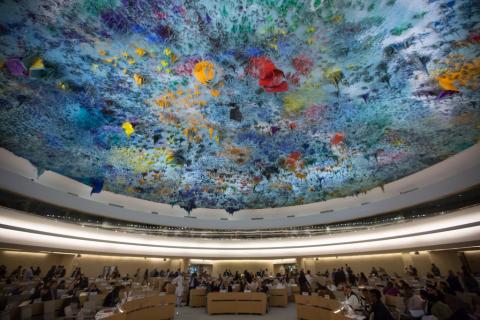
On March 14, 2019, the UN Human Rights Council formally adopted Jordan’s outcome report in the framework of its Universal Periodic Review (UPR) which took place on November 8. Jordan received a total of 226 recommendations made by other United Nations Member States aimed at improving the human rights situation in the country. 66% of the recommendations were accepted, while the rest were merely “noted”, which in practice means they were rejected.
Soon after the UPR in November, the Jordanian authorities had already announced that they accepted 131 recommendations, “noted” 74, and would respond to the 21 remaining by the 40th session of the Human Rights Council. Last Thursday, they commented on these 21 recommendations, “noting” five and endorsing the rest.
Alkarama, which submitted a shadow report highlighting its key concerns ahead of the review, is concerned that the “noted” recommendations touch upon highly problematic issues that are yet to be addressed. Alkarama recalls that the human rights situation in Jordan had not significantly improved since the country’s second UPR in 2013 despite the adoption of a Comprehensive National Plan on Human Rights in 2016.
Ratification of core international human rights treaties
We are concerned that the Jordanian authorities did not endorse specific recommendations to ratify international human rights instruments to which the country is not yet a party, including the Optional Protocol to the Convention against Torture and the International Convention for the Protection of All Persons from Enforced Disappearance.
Freedom of expression and association
It is concerning that Jordan did not accept, among others, Canada’s recommendation to “[r]espect journalists’ right to freedom of expression by restricting the trial of journalists for “publications crimes” stipulated in the Criminal Code to civilian courts, and by amending article 11 of the cybercrime law, to narrow the definition of hate speech”, or the United States’ recommendation to “remove the definition of “hate speech” from the proposed amendments to the cybercrime law”.
This is very concerning since amendments to the cybercrime law are currently being discussed in the country, which broadly define the offense of hate speech and include severe penalties ranging from fines to prison terms. Civil society organisations have expressed their fear that the proposals would have an adverse impact on the peaceful exercise of freedom of expression in the country.
In addition, Jordan only noted several recommendations pertaining to the right to association, such as Switzerland’s call to “repeal the law on associations in order to streamline the administrative processes which restrict the activities and the funding of civil society organizations”.
Torture
Although the practice of torture in Jordan remains widespread, the authorities only noted Canada’s recommendation to “take immediate measures to stop mistreatment in custody” and Spain’s call to “modify article 208 of the Criminal Code so that torture is categorized as a serious crime instead of a minor crime”.
Alkarama is concerned that, in the absence of a comprehensive legal framework to tackle the issue of torture, a climate of impunity will continue to prevail. Furthermore, cases of alleged torture by security officials continue to be handled by police courts, which fall under the authority of the Ministry of Interior, and Jordan did not accept the United States’ recommendation to have such cases refer to independent civil courts.
Human rights and counter-terrorism
During the UPR, Alkarama regretted that only one recommendation addressed the need to amend the Antiterrorism Law to bring it into line with the International Covenant on Civil and Political Rights (ICCPR), as human rights continue to be systematically violated under the pretext of fighting terrorism.
Although the recommendation was accepted by Jordan, the authorities stated in their outcome report that it was “already implemented” since the law was “in line with the ICCPR. Such denial is alarming considering counterterrorism is often used as pretext to crackdown on fundamental rights and freedoms. Alkarama has documented numerous case of abuses by the General Intelligence Directorate and State Security Court, including peaceful activists and dissenting voices who have been detained by the GID and prosecuted before the State Security Court (SSC) for allegedly disturbing either “the public order” or “relations with a foreign state.”
What is next?
Jordan now has until its next UPR to implement the accepted recommendations. Alkarama will continue to monitor the situation on the ground and call on the authorities to implement the agreed measures in good faith.
For more information or an interview, please contact media@alkarama.org (Dir: +41 22 734 1006).
